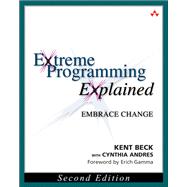
Note: Supplemental materials are not guaranteed with Rental or Used book purchases.
Purchase Benefits
Looking to rent a book? Rent Extreme Programming Explained Embrace Change [ISBN: 9780321278654] for the semester, quarter, and short term or search our site for other textbooks by Beck, Kent; Andres, Cynthia. Renting a textbook can save you up to 90% from the cost of buying.
Kent Beck consistently challenges software engineering dogma, promoting ideas like patterns, test-driven development, and Extreme Programming. Currently affiliated with Three Rivers Institute and Agitar Software, he is the author of many Addison-Wesley titles.
Cynthia Andres holds a B.S. in psychology with advanced work in organizational behavior, decision analysis, and women’s studies. She has worked with Kent on the social aspects of Extreme Programming since its inception. She is also affiliated with Three Rivers Institute.
| Foreword to the Second Edition | xv | ||||
| Foreword to the First Edition | xvii | ||||
| Preface | xxi | ||||
|
1 | (8) | |||
|
9 | (114) | |||
|
11 | (2) | |||
|
13 | (4) | |||
|
17 | (6) | |||
|
18 | (1) | |||
|
18 | (1) | |||
|
19 | (1) | |||
|
20 | (1) | |||
|
21 | (1) | |||
|
21 | (2) | |||
|
23 | (12) | |||
|
24 | (1) | |||
|
25 | (1) | |||
|
26 | (1) | |||
|
27 | (1) | |||
|
28 | (1) | |||
|
29 | (1) | |||
|
29 | (1) | |||
|
30 | (1) | |||
|
30 | (1) | |||
|
31 | (1) | |||
|
32 | (1) | |||
|
32 | (1) | |||
|
33 | (1) | |||
|
34 | (1) | |||
|
35 | (2) | |||
|
37 | (18) | |||
|
37 | (1) | |||
|
38 | (1) | |||
|
39 | (2) | |||
|
41 | (1) | |||
|
42 | (2) | |||
|
44 | (2) | |||
|
46 | (1) | |||
|
47 | (1) | |||
|
48 | (1) | |||
|
49 | (1) | |||
|
49 | (1) | |||
|
50 | (1) | |||
|
51 | (4) | |||
|
55 | (6) | |||
|
61 | (12) | |||
|
61 | (1) | |||
|
62 | (1) | |||
|
63 | (1) | |||
|
64 | (1) | |||
|
64 | (2) | |||
|
66 | (1) | |||
|
66 | (1) | |||
|
67 | (1) | |||
|
68 | (1) | |||
|
69 | (1) | |||
|
69 | (4) | |||
|
73 | (12) | |||
|
74 | (1) | |||
|
75 | (1) | |||
|
75 | (1) | |||
|
76 | (1) | |||
|
77 | (1) | |||
|
78 | (2) | |||
|
80 | (1) | |||
|
81 | (1) | |||
|
81 | (1) | |||
|
81 | (1) | |||
|
82 | (3) | |||
|
85 | (6) | |||
|
91 | (6) | |||
|
97 | (6) | |||
|
103 | (8) | |||
|
109 | (2) | |||
|
111 | (8) | |||
|
111 | (2) | |||
|
113 | (1) | |||
|
113 | (1) | |||
|
114 | (1) | |||
|
115 | (1) | |||
|
115 | (1) | |||
|
116 | (3) | |||
|
119 | (4) | |||
|
123 | (38) | |||
|
125 | (6) | |||
|
131 | (4) | |||
|
135 | (4) | |||
|
139 | (6) | |||
|
143 | (1) | |||
|
144 | (1) | |||
|
145 | (4) | |||
|
146 | (3) | |||
|
149 | (4) | |||
|
153 | (4) | |||
|
157 | (2) | |||
|
159 | (2) | |||
| Annotated Bibliography | 161 | (14) | |||
| Index | 175 |
The New copy of this book will include any supplemental materials advertised. Please check the title of the book to determine if it should include any access cards, study guides, lab manuals, CDs, etc.
The Used, Rental and eBook copies of this book are not guaranteed to include any supplemental materials. Typically, only the book itself is included. This is true even if the title states it includes any access cards, study guides, lab manuals, CDs, etc.